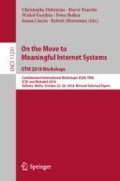Abstract
Currently software testing has become critical, expensive (time and cost), effort intensive activity. There are times when software development teams keep the testing activities until a feature development completion which impacts the delivery and quality. To overcome certain friction in quality, there are methods like automation which are applied to various phases of development but often the regression element is skipped. The paper stresses on key elements like automation, quality metrics, feedback and collaboration between cross units in case of diverse team sets in a large organization. The paper tries to present a framework where collaboration, standardization of software testing approach at each level of development becomes critical for successful and high-quality software delivery.
Access this chapter
Tax calculation will be finalised at checkout
Purchases are for personal use only
References
Leicht, N., Blohm, I., Leimeister, J.M.: Leveraging the power of the crowd for software testing. IEEE Softw. 34(2), 62–69 (2017). https://doi.org/10.1109/MS.2017.37
Buffardi, K., Robb, C., Rahn, D.: Tech startups: realistic software engineering projects with interdisciplinary collaboration. J. Comput. Sci. Coll. 32(4), 93–98 (2017)
Abrahamsson, P., et al.: Agile software development methods: review and analysis. arXiv preprint arXiv:1709.08439 (2017)
Grechanik, M., Xie, Q., Fu, C.: Creating GUI testing tools using accessibility technologies. In: International Conference on Software Testing, Verification and Validation Workshops, ICSTW 2009. IEEE (2009)
Zhao, Y., et al.: The impact of continuous integration on other software development practices: a large-scale empirical study. In: Proceedings of the 32nd IEEE/ACM International Conference on Automated Software Engineering. IEEE Press (2017)
Davis, F.D., Venkatesh, V.: Toward preprototype user acceptance testing of new information systems: implications for software project management. IEEE Trans. Eng. Manag. 51(1), 31–46 (2004)
Bell, J., Sheth, S., Kaiser, G.: Secret ninja testing with HALO software engineering. In: Proceedings of the 4th International Workshop on Social Software Engineering. ACM, New York (2011)
Banzai, T., et al.: D-cloud: design of a software testing environment for reliable distributed systems using cloud computing technology. In: Conference on 10th IEEE/ACM International Cluster, Cloud and Grid Computing (CCGrid). IEEE (2010)
Lauesen, S., Younessi, H.: Is software quality visible in the code. IEEE Softw. 15(4), 69–73 (1998)
Thomas, K.W.: Conflict and conflict management: reflections and update. J. Organ. Behav. 13(3), 265–274 (1992)
Fiore, S.M., Salas, E.: Team cognition and expert teams: developing insights from cross–disciplinary analysis of exceptional teams. Int. J. Sport Exerc. Psychol. 4(4), 369–375 (2006). https://doi.org/10.1016/0022-2836(81)90087-5
Burrell, J., et al.: Context-aware computing: a test case. In: Borriello, G., Holmquist, L.E. (eds.) UbiComp 2002. LNCS, vol. 2498, pp. 1–15. Springer, Heidelberg (2002). https://doi.org/10.1007/3-540-45809-3_1
Garousi, V., et al.: What industry wants from academia in software testing?: hearing practitioners’ opinions. In: Proceedings of the 21st International Conference on Evaluation and Assessment in Software Engineering. ACM (2017)
Fowler, M.: Testpyramid, May 2012. https://martinfowler.com/bliki/TestPyramid.html. Accessed 04 May 2017
Hansen, P., Hacks, S.: Continuous delivery for enterprise architecture maintenance. Full-scale Software Engineering/The Art of Software Testing 56 (2017)
Author information
Authors and Affiliations
Corresponding author
Editor information
Editors and Affiliations
Rights and permissions
Copyright information
© 2019 Springer Nature Switzerland AG
About this paper
Cite this paper
Mahanta, P., Bischoff, G. (2019). Framework for Collaborative Software Testing Efforts Between Cross-Functional Teams Aiming at High Quality End Product. In: Debruyne, C., Panetto, H., Guédria, W., Bollen, P., Ciuciu, I., Meersman, R. (eds) On the Move to Meaningful Internet Systems: OTM 2018 Workshops. OTM 2018. Lecture Notes in Computer Science(), vol 11231. Springer, Cham. https://doi.org/10.1007/978-3-030-11683-5_21
Download citation
DOI: https://doi.org/10.1007/978-3-030-11683-5_21
Published:
Publisher Name: Springer, Cham
Print ISBN: 978-3-030-11682-8
Online ISBN: 978-3-030-11683-5
eBook Packages: Computer ScienceComputer Science (R0)

